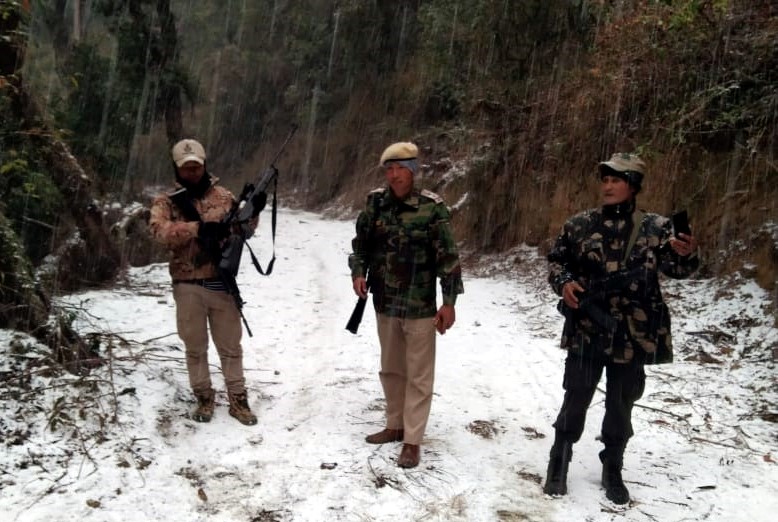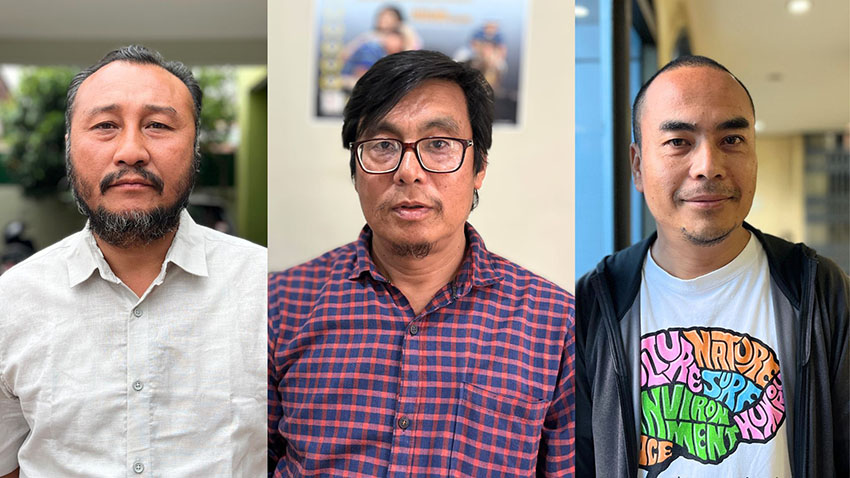The hope of Mao people for a respite from the restriction of their movement in Southern Angami areas in Nagaland imposed by Southern Angami People Organisation (SAPO) of Nagaland before Christmas meets with a dead-end as the SAPO has rejected the verdict of the Tenyimi People’s Organisation (TPO) that was supposed to help resolve the conflict between the SAPO in Nagaland and Mao Council in Manipur.
TPO is an apex body of 10 tribes from Nagaland and Manipur including Angami, Chakhesang, Pochury, Zeliangrong, Rengma, Mao, Maram, Poumai, Thangal, and Inpui who are nomenclatured as Tenyimia tribes.
The conflict between Mao people of Manipur and Southern Angamis of Nagaland became open with SAPO’s exclusive claim over Dzuko Valley and Koziiri Forest, which is known as Kezoltsa by the Southern Angamis while Koziiri Forest is well inside the territory of Manipur beyond Dzuko Valley though Dzukou Valley spreads over the two states.
SAPO on December 21 has rejected the verdict of the TPO following an emergency meeting held at Zakhama village and attended by all its member villages under the organisation, reaffirming their December 15 decision to restrict and prohibit any member of Mao community from entering or travelling to the Southern Angami region bordering Manipur till the matter is resolved by TPO.
Reports quoted the SAPO president, Kevipodi Sophie as saying that initially the TPO notified that it would deliver a judgement to the “dispute” as per the Tenyimia traditional and customary way of settling land dispute issues, which was why SAPO had signed an undertaking to abide by the verdict. However, the TPO had failed to keep its word and deviated from the customary way of settling dispute and so the judgement could not be accepted.
The TPO’s Board of Arbitrators (BOA) gave a verdict on December 19, 2022 that “the century-old Kezoltsa/Koziiri/ Kazing forest and Dzukou Valley shall be a common property of the SAPO, the Mao Council, and the Maram Khullen village”.
Further, the verdict directed that the century-old forest shall be preserved and protected from exploitation or destruction. The collection of forest produce, hunting or fishing would be strictly prohibited and that a forest committee shall be constituted to protect and preserve the forest and the members of the committee shall be drawn from all the three parties in the present case.
Explaining the rejection of the verdict, SAPO said that it was not acceptable to them as the verdict was not as per the Tenyimi customary practices. “The verdict was one-sided. Besides, the TPO had failed to take any actions even when the Mao people during the Sangai festival entered the disputed areas which other parties were not allowed access,” SAPO president said.
Further, reports quoted SAPO president, Kevipodi Sophie as explaining that the restriction on the Mao community came into force after the Mao Council led the Manipur Government into Kozirii (Kezoltsa as known to Southern Angamis) where the Manipur Government built permanent barracks, which was a total violation of all the previous undertakings between the parties.
He voiced his resentment at the Mao Council saying that it had disregarded all prior agreements made between them and caused the present crisis. The security forces from Manipur stationed at Koziiri (Kezoltsa) even prevented TPO from setting foot in the area when TPO went there to repair its rest camp a few years ago. Such action by the Mao Council was a total disregard for the Tenyimi community, which compelled SAPO to impose the restrictions, the SAPO president stated.
Reports said that SAPO president was surprised over the inclusion of the Dzukou Valley issue in the verdict, saying that SAPO had never made any mention of it in its written statement submitted to TPO.
However, unfortunately, following SAPO’s imposition of ban on the movemment of Mao people of Manipur in Southern Angami Areas in Manipur with effect from December 15, a Manipur bound goods-laden truck was burnt down at Viswema under Khuzama police Stattion in Nagaland on the night of December 17.

Moreover, Manipur-bound 55 students belonging to Mao community were stranded in Dimapur in Nagaland due to the SAPO’s restriction on the movement of Mao people in Southern Angami inhabited areas of Nagaland. Later, the students were airlifted from Dimapur to Imphal on the morning of December 20 through a chartered flight arranged by the Manipur Government.
It may be mentioned that the present conflict between the SAPO and Mao Council began when the SAPO blamed the Mao Council and the Manipur Government of “threatening the very peaceful co-existence and security of the region by harbouring and deploying the Manipur Armed security personnel imposing 144 Cr.PC and forcefully constructing illegal roads, houses, electrification, demolitionof the rest house of Southern Angami people and constructing an illegal alternative route to Dzukou …”
In response to the restriction of Mao people in Southern Angami area by SAPO, the Mao Council said in a rejoinder on December 16 that, after the Tenyimi People’s Organisation (TPO) intervened in 2015-16 in the present dispute over Dzuko and Koziiri, which is known as Kezoltsa by the Southern Angamis, it was decreed that contending parties should refrain from going to the media to avoid paper war and to ensure conducive environment.
The Mao Council said that the SAPO statement of December 7, 2022 was the latest of several statements of SAPO and Southern Angami Youths Organisation (SAYO) “freely issued to misrepresent” to the public on the facts and situation of the dispute. It also said that the Mao people in deference to the TPO stricture have refrained from going to the press.
“Our silence has been severely misconstrued as seen from postings in social media,” the Mao Council said.
Therefore, it was constrained to issue this rejoinder to nullify the “distortions and misinformation” propagated in the media after having informed the office of the TPO of the necessity and “our intention” to set the record straight, the Mao Council said in the rejoinder.
According to the Mao Council, in the SAPO release it has been projected that the Mao and Maram people from Manipur had teamed up against the Southern Angamis of Nagaland. The Council said that this is “blatantly misleading” and the reverse seems obvious.
“Maram Khullen is a separate claimant over Koziiri (Dzuko excluded) who came in much later and was admitted by TPO as party to the dispute only in March 2016 and the dispute thereafter became an unprecedented triangular contest.
“While the Mao Council cannot speak for the Government of Manipur (GOM), it is because of the SAPO/SAYO’s unlawful and provocative activities in Koziiri/Dzuko area that the Manipur Government promulgated 144 CrPC, constructed police base camp and connected road in Koziirii area”.
“In terms of location, 2/3 of the total Dzuiiko area falls under Manipur state,” it also stated.
In 2000, according to the Mao Council, the illegal construction of a SAPO rest house at Chitekayi Ingo, which is well within Mao traditional land brought in Koziirii (Kezoltsa in SAPO), the thick forest adjacent to the Mao Dzukou area as an area of dispute.
However, the statement also said that Mao people cannot be prohibited from living their lives, least of all from taking up any activity “within our own traditional land” that is well between the bounds of law and of the “Arbitration Undertaking”.
Now, though the Mao Council believes in the “Arbitration Undertaking” and Tenyimia traditional and customary way of settling land dispute issues; the SAPO’s rejection of the TPO’s Board of Arbitrators’ judgement and steadfast stand to continue the ban of Mao people’s movement in Southern Angami Area deepens the conflict between them.
Consequently, the State Governents need to bring up the matter on the table with the intervention of the Government of India, if needed, settle once and for all before it becomes more violent.












